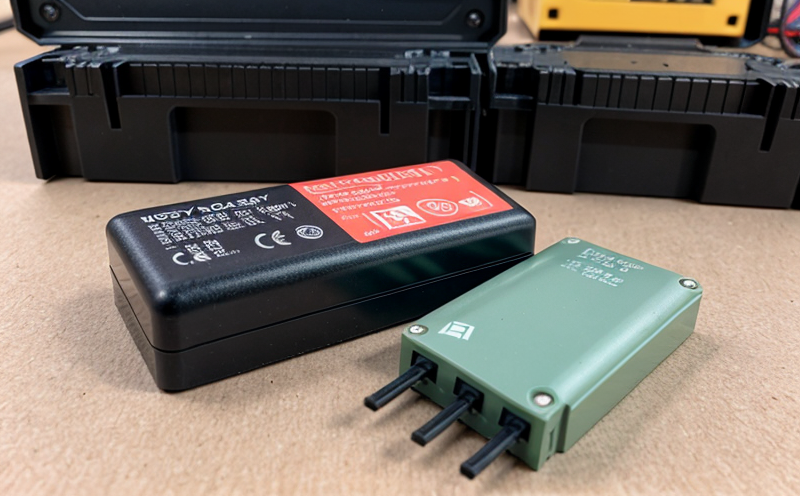IEC 62660-2 Lithium-Ion Battery Modules for EV Performance Testing
The IEC (International Electrotechnical Commission) standard, specifically IEC 62660-2, provides a comprehensive framework for the testing of lithium-ion battery modules and packs used in electric vehicles (EVs). This standard ensures that batteries meet performance, safety, and durability requirements necessary for safe and reliable operation. The focus on EV performance encompasses both the electrical characteristics of the battery module as well as its interaction with the vehicle's powertrain.
The testing outlined in IEC 62660-2 is essential to ensure compliance with global regulatory standards and to verify that a battery module can withstand real-world conditions. The standard covers various aspects, including but not limited to, thermal management, mechanical integrity, electrical performance under different operating conditions, and the ability of the module to recover from abuse conditions (such as overcharging or deep discharge).
For electric vehicles, where the battery is a critical component affecting range and safety, these tests are indispensable. By adhering to this standard, manufacturers can ensure that their products meet stringent international requirements, thereby enhancing brand reputation and marketability.
The testing procedures in IEC 62660-2 are designed to simulate the operational environment of an EV battery under various conditions, including but not limited to:
- Charging and discharging cycles
- Thermal cycling (to assess thermal management systems)
- Cold and hot weather tests for environmental adaptation
- Overcharge/overdischarge scenarios to evaluate abuse tolerance
The testing can be conducted on a variety of battery modules, including prismatic, cylindrical, and pouch cells. The results of these tests are critical in determining the suitability of a battery module for use in EVs.
Compliance with IEC 62660-2 is not only about meeting regulatory requirements but also about ensuring product reliability and performance. By adhering to this standard, manufacturers can ensure that their products meet stringent international requirements, thereby enhancing brand reputation and marketability.
Industry Applications
The IEC 62660-2 testing is particularly relevant for the automotive sector, especially in the development and certification of lithium-ion battery modules for electric vehicles. The stringent testing procedures ensure that these batteries can perform reliably under a wide range of conditions, from extreme cold to high temperatures, and during various charging cycles.
Automakers rely on this standard to validate their products before they enter the market. It helps in identifying potential weaknesses early in the development process, allowing for timely corrections. This ensures that the final product is not only safe but also performs well under real-world conditions. Additionally, compliance with IEC 62660-2 can help manufacturers secure international certifications and approvals, which are crucial for exporting products to different countries.
The testing is equally important for suppliers of battery modules to automakers. By adhering to this standard, these suppliers ensure that their products meet the quality and performance standards expected by the automotive industry. This not only enhances trust between partners but also ensures a high level of product reliability across the supply chain.
Why Choose This Test
- Comprehensive Coverage: The IEC 62660-2 test encompasses multiple aspects, ensuring that battery modules meet all necessary safety and performance criteria.
- Regulatory Compliance: Meeting this standard ensures compliance with international regulations, facilitating easier market entry in various countries.
- Innovation: The testing helps identify potential improvements for the next generation of EV batteries.
- Quality Assurance: By adhering to this standard, manufacturers can ensure consistent product quality across different batches and production runs.
- Risk Mitigation: Identifying weaknesses early in the development process allows for timely corrections, reducing risks associated with poor performance or safety issues.
- Enhanced Reputation: Compliance with international standards enhances a company's reputation and marketability.
The rigorous testing procedures ensure that battery modules are robust enough to meet the demanding requirements of electric vehicles. This not only enhances product reliability but also helps in building trust among consumers, partners, and regulatory bodies.
International Acceptance and Recognition
The IEC 62660-2 standard is widely recognized and accepted across the globe. It has been adopted by numerous countries as a benchmark for testing lithium-ion battery modules used in electric vehicles. The acceptance of this standard ensures that manufacturers can leverage it to meet global regulatory requirements, thereby streamlining the process of product certification.
By adhering to IEC 62660-2, companies demonstrate their commitment to quality and safety, which is crucial for maintaining a positive reputation in the industry. The standard's international acceptance also facilitates easier market entry into different regions, as it reduces the need for additional testing or certifications.
The widespread adoption of this standard has contributed to the development of consistent testing protocols across various countries. This consistency ensures that manufacturers can achieve reliable results regardless of where they choose to conduct their tests or sell their products. As a result, compliance with IEC 62660-2 is increasingly becoming a prerequisite for companies operating in the electric vehicle and battery module sectors.





